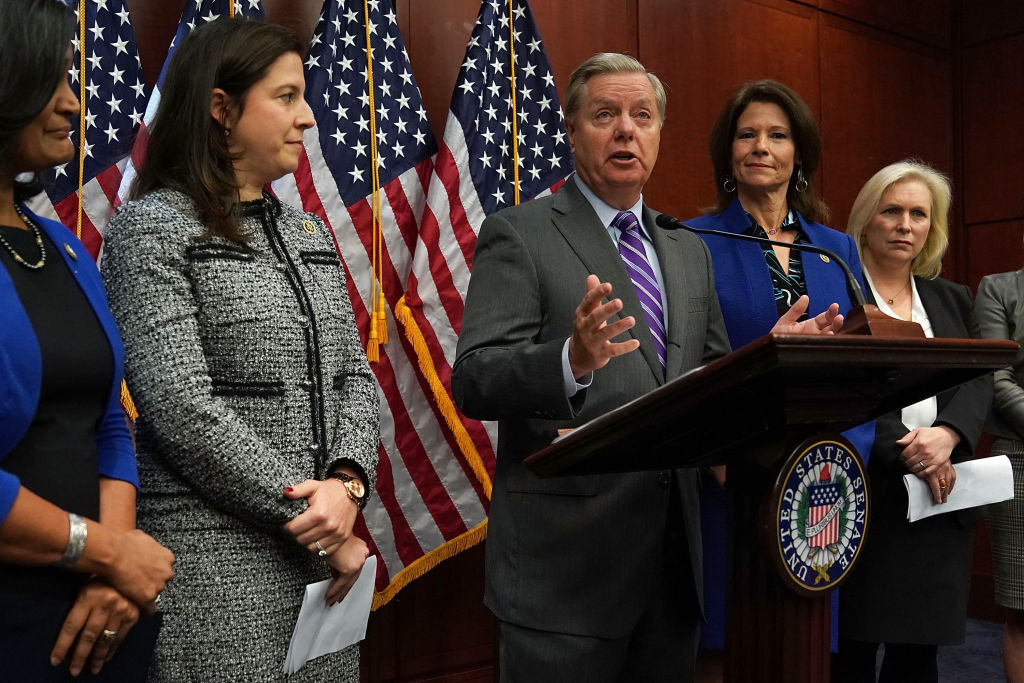Congress is working on legislation to reverse the GOP's recent dismantling of sexual harassment protections


A free daily email with the biggest news stories of the day – and the best features from TheWeek.com
You are now subscribed
Your newsletter sign-up was successful
Last spring, congressional Republicans passed and President Trump signed a law repealing former President Barack Obama's Fair Pay and Safe Workplaces rule, finalized in August 2016, as part of their liberal use of the Congressional Review Act to nullify 14 Obama-era regulations. The rule required federal contractors to disclose sexual harassment and other labor violations before receiving significant federal contracts, Politico reports, and also forbade large contractors from forcing employees to take labor complaints to arbitration, typically secret proceedings where the worker is more likely to lose than in court.
Mandatory arbitration plays a big part in sexual misconduct cases, and former Fox News anchor Gretchen Carlson has made abolishing such clauses — ubiquitous in her former employer's sexual harassment settlements — a central plank in her campaign against sexual harassment. A few months after Trump signed the Fair Pay and Safe Workplaces repeal, The New York Times published its exposé on Hollywood producer Harvey Weinstein, starting the #MeToo moment that has forced out prominent men in media, the arts, and Congress.
"I can tell you without a doubt," Ben Olinsky, an Obama labor policy aide who helped write the jettisoned rule, tells Politico. "This provision would have brought significant new accountability to federal contractors with sexual harassment and assault." Now, Congress is working on bipartisan legislation, Senate bill 2203, that would ban forced arbitration not just among federal contractors but all businesses. Its main sponsor, Sen. Lindsey Graham (R-S.C.), voted to repeal the Obama rule.
The Week
Escape your echo chamber. Get the facts behind the news, plus analysis from multiple perspectives.

Sign up for The Week's Free Newsletters
From our morning news briefing to a weekly Good News Newsletter, get the best of The Week delivered directly to your inbox.
From our morning news briefing to a weekly Good News Newsletter, get the best of The Week delivered directly to your inbox.
Republicans say they did not repeal the Obama rule because of sexual harassment, which they point out is already illegal. But labor experts say contractors are especially vulnerable to sexual harassment, and the problem has grown as the number of federal contractors has mushroomed, costing more than $400 billion a year now from $182 billion in 1993. You can read more about the proposed and scrapped regulations at Politico.
A free daily email with the biggest news stories of the day – and the best features from TheWeek.com
Peter has worked as a news and culture writer and editor at The Week since the site's launch in 2008. He covers politics, world affairs, religion and cultural currents. His journalism career began as a copy editor at a financial newswire and has included editorial positions at The New York Times Magazine, Facts on File, and Oregon State University.
-
 The Week Unwrapped: Have televised confessions quelled protests in Iran?
The Week Unwrapped: Have televised confessions quelled protests in Iran?Podcast Plus, why has Elon Musk turned from Mars to the Moon? And will the BBC prove to be a puzzles champ?
-
 The week’s best photos
The week’s best photosIn Pictures An Andean god, a rogue squirrel, and more
-
 AI surgical tools might be injuring patients
AI surgical tools might be injuring patientsUnder the Radar More than 1,300 AI-assisted medical devices have FDA approval
-
 House votes to end Trump’s Canada tariffs
House votes to end Trump’s Canada tariffsSpeed Read Six Republicans joined with Democrats to repeal the president’s tariffs
-
 Bondi, Democrats clash over Epstein in hearing
Bondi, Democrats clash over Epstein in hearingSpeed Read Attorney General Pam Bondi ignored survivors of convicted sex offender Jeffrey Epstein and demanded that Democrats apologize to Trump
-
 El Paso airspace closure tied to FAA-Pentagon standoff
El Paso airspace closure tied to FAA-Pentagon standoffSpeed Read The closure in the Texas border city stemmed from disagreements between the Federal Aviation Administration and Pentagon officials over drone-related tests
-
 Judge blocks Trump suit for Michigan voter rolls
Judge blocks Trump suit for Michigan voter rollsSpeed Read A Trump-appointed federal judge rejected the administration’s demand for voters’ personal data
-
 US to send 200 troops to Nigeria to train army
US to send 200 troops to Nigeria to train armySpeed Read Trump has accused the West African government of failing to protect Christians from terrorist attacks
-
 Grand jury rejects charging 6 Democrats for ‘orders’ video
Grand jury rejects charging 6 Democrats for ‘orders’ videoSpeed Read The jury refused to indict Democratic lawmakers for a video in which they urged military members to resist illegal orders
-
 Judge rejects California’s ICE mask ban, OKs ID law
Judge rejects California’s ICE mask ban, OKs ID lawSpeed Read Federal law enforcement agents can wear masks but must display clear identification
-
 Lawmakers say Epstein files implicate 6 more men
Lawmakers say Epstein files implicate 6 more menSpeed Read The Trump department apparently blacked out the names of several people who should have been identified
